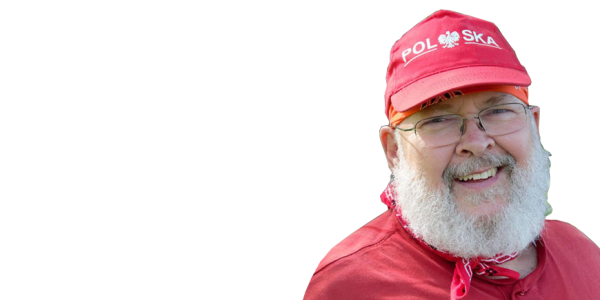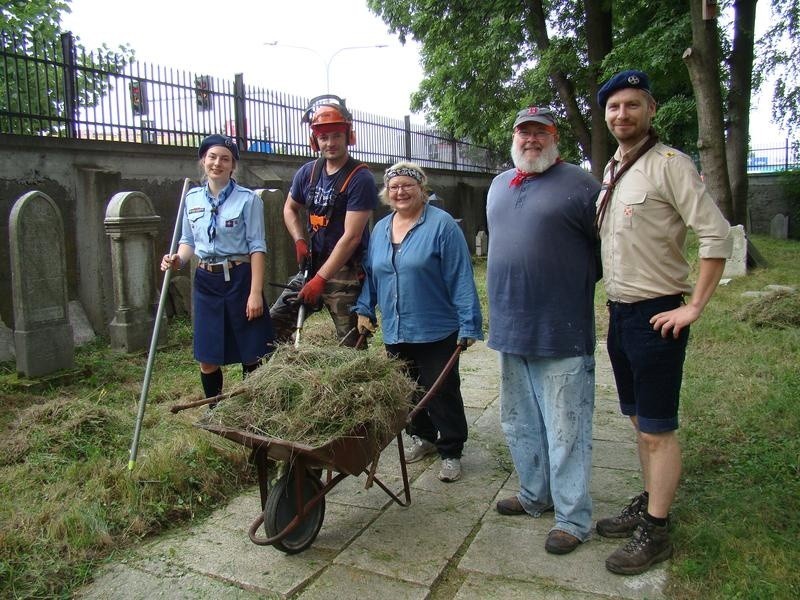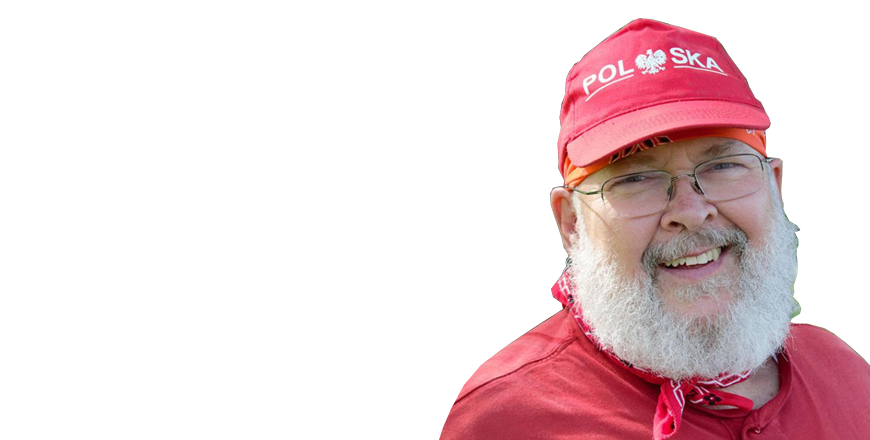Baptysta, pastor Steven D. Reece założyciel fundacji Matzevah laureatem tytułu Człowiek Pojednania 2022
20/12/2022 | Na stronie od 23/12/2022

Steven Reece, założyciel amerykańskiej fundacji, która powstała w 2010 roku
Polska Rada Chrześcijan i Żydów na zebraniu 20 grudnia 2022 przyznała tytuł Człowiek Pojednania pastorowi Stevenowi D. Reece
Za dany rok przyznajemy tytuł CZŁOWIEK POJEDNANIA osobom spoza Polski, które są szczególnie zasłużone dla dialogu chrześcijańsko-żydowskiego w Polsce, w uznaniu ich wyjątkowego wkładu w dzieło zbliżenia, lepszego poznania i pojednania chrześcijan i Żydów w Polsce.
Uroczystość nadania tytułu Człowiek Pojednania, który w roku 2022 otrzymał Pastor Dr Steven Reece, wtorek, 31. stycznia 2023
Pastor Steven D. Reece kieruje działaniami amerykańskich baptystów na żydowskich cmentarzach w Polsce.
Od szesnastu lat kieruje działaniami amerykańskich baptystów na żydowskich cmentarzach w Polsce. Co roku przyjeżdżają do naszego kraju, aby porządkować kolejna miejsca.

Zaczął te działania od Otwocka w roku 2006.
Wtedy otoczono teren cmentarza polnymi głazami narzutowymi (łącznie około 80 ton).
Założył fundację Matzevah, która kontynuuje te działania w różnych miejscach Polski
W następnych latach Steven Reece założył fundację Matzevah, która kontynuuje te działania w różnych miejscach Polski. W sumie działali już w kilkudziesięciu miejscowościach.
Oto przykłady:
- W ciągu kilku lat Fundacja Matzevah z USA uporządkowała kilkadziesiąt starych cmentarzy żydowskich w Polsce, w tym oświęcimski kirkut. Ostatnio jej wolontariusze byli znów w Oświęcimiu. – Przyjechaliśmy tutaj już po raz piąty – podkreśla Steven Reece, założyciel amerykańskiej fundacji, która powstała w 2010 roku.
- „Mamy powinność, żeby troszczyć się o miejsca pamięci Żydów”. Cmentarz w Markuszowie z nowym ogrodzeniem. 29.06.2022. Więcej:
- Wakacje to czas wytężonej pracy dla działaczy i sympatyków amerykańskiej The Matzevah Foundation. Od 17 czerwca wolontariusze fundacji sprzątali cmentarz w Krzepicach, tydzień później przenieśli się do Krośniewic, a w sierpniu pojawili się w Oświęcimiu. W poniedziałek, 19 sierpnia fundacja rozpoczęła porządkowanie cmentarza w Przerośli. W prace angażują się także miejscowi społecznicy i potomkowie żydowskich emigrantów.https:
- Wolontariusze sprzątają zambrowski kirkut{.target_blank}
- Steven Reece z Matzevah Foundation i Krzysztof Kot z Fundacji Koszary organizują akcję sprzątania i porządkowania cmentarza żydowskiego w Sulbinach w gm. Garwolin. Ty także możesz pomóc!
- To były pracowite dwa dni! Na cmentarzu żydowskim w Sulbinach grupa pasjonatów historii z wolontariuszami oczyściła ścieżki, wyczyściła macewy i uporządkowała teren wokół nich. Podczas prac udało się odnaleźć także kilka macew.
Do wspólnych prac zaprosili organizatorzy akcji: Matzevah Foundation i jej przedstawiciel Steven Reece oraz Krzysztof Kot z Fundacji Koszary - Przywróćmy Pamięć i portalu Garwolin.org. W dwudniową akcję porządkowania cmentarza żydowskiego w Sulbinach włączyła się Miejsko-Powiatowa Biblioteka Publiczna w Garwolinie, ZHP Hufiec "Orłów", Nadleśnictwo Garwolin, Lasy Państwowe Tomasz Kuliński z Towarzystwa Historycznego "Odrowąż" oraz wolontariusze. Prace wykonywane były pod ścisłym nadzorem Komisji Rabinicznej ds. Cmentarzy. - W dniach 13 - 17 sierpnia wolontariusze z amerykańskiej Fundacji Matzevah będą porządkować oświęcimski cmentarz żydowski. Wolontariusze liczą na zaangażowanie lokalnej społeczności. Jeśli masz ochotę pomóc porządkować to wyjątkowe miejsce prosimy o kontakt
- Projekt renowacji cmentarza realizowany jest przez Fundację Ochrony Dziedzictwa Żydowskiego i The Matzevah Foundation. Prowadzone w tym tygodniu prace są pierwszym krokiem do budowy ogrodzenia cmentarza w przyszłym roku oraz nadania nowego wyglądu żydowskiej nekropolii w Zambrowie.
- 21 lipca br. odbyła się uroczystość rededykacji Cmentarza Żydowskiego w Markuszowie. Inicjatorem przedsięwzięcia był prof. Dan Oren z USA. Dzięki współpracy ze Stowarzyszeniem Studnia Pamięci z Lublina i pracy Pawła Sygowskiego, który w latach 90. XX w. przeprowadził kompleksową inwentaryzację wszystkich zachowanych macew na markuszowskim cmentarzu udało się ustalić, że przodkowie Dana Orena spoczywają na markuszowskim cmentarzu.
Na ekumeniczną uroczystość przybyło wielu znakomitych gości: przedstawiciele ambasady USA w Warszawie, biskup Mieczysław Cisło, przedstawiciel biura naczelnego rabina Polski Yehoshua Ellis, Monika Krawczyk, dyrektor Fundacji Ochrony Dziedzictwa Żydowskiego, Steven Reece, dyrektor Matzevah Foundation z USA, Teresa Klimowicz ze Stowarzyszenia Studnia Pamięci, goście z USA, Niemiec, Izraela a nawet z Japonii. Nie zabrakło także mieszkańców Markuszowa.
Steven D. Reece Founder and CEO, The Matzevah Foundation, Inc.<<<
Steven worked as a photojournalist before entering religious and charitable work. He leads The Matzevah Foundation to care for and restore Jewish cemeteries in Poland, commemorate mass grave sites, and educate the public about the Holocaust.
Steven is an ordained Baptist minister and is a graduate of Baylor University and Southwestern Baptist Theological Seminary. He is certified to teach about the Holocaust through Yad Vashem and Tel Aviv University. Presently, he is a candidate for the PhD in Leadership at Andrews University and will soon graduate.

Recording Cultural Genocide and Killing Sites in Jewish Cemeteries:
Origins: Before the Holocaust, Jewish cemeteries were at the heart of Jewish communities, as places where history was preserved and remembered. During the Holocaust, the Nazis saw them as physical and symbolic expressions of Jewish culture. In an attempt to erase all traces of Jewish people, tombstones were toppled, graves desecrated, bones removed, and funerary houses looted. Not content with inflicting physical damage, the Nazis used cemeteries as execution sites, with mass graves excavated for (and sometimes by) those killed.
Goals: This project will raise awareness of the causes and consequences of cultural and physical genocide within Jewish cemeteries, directly tackling racism, xenophobia and hostility in the present. It will mark the beginning of a planned long-term collaboration between the project partners as part of a commitment to researching these important, yet under-examined, aspects of Holocaust history.
Steven Reece jest obecnie doradcą European Jewish Cemeteries Advisory Network.
Informacje po angielsku:
W bieżącym roku akademickim Steven D. Reece pracuje na Uniwersytecie Szczecińskim w ramach stypendium Fulbrighta.
Prof. Radosław Ptaszyński z Instytutu Historycznego Uniwersytetu Szczecińskiego o Reece’a: On naprawdę wierzy w chrześcijaństwo i pojednanie.
Rekomendacja dla Stevena Reece’a, od prof. Radosława Ptaszyńskiego, który jest przewodniczącym Rady Naukowej Instytutu Historycznego Uniwersytetu Szczecińskiego i animatorem projektu Jewish Przysucha:
Dr. Stevena D. Reece’a poznałem w 2018 r., gdy rozpocząłem przygotowania do realizacji projektu sprzątania cmentarza żydowskiego w Przysusze. Zaskoczyła mnie wówczas jego otwartość, chęć pomocy i głęboka znajomość tematyki. Od tego momentu prowadzimy ten projekt wspólnie. Przy czym dr Reece reprezentuje założoną i kierowaną przez siebie fundację Matzevah Foundation.
W przypadku Stevena udział w projekcie nie polega jedynie na koordynowaniu działań, zbieraniu funduszy, w egzotycznych nieco Georgii czy Teksasie, ale osobistym bezpośrednim zaangażowaniu, czyli po prostu na fizycznej pracy. Steven profesjonalnie posługuje się takimi narzędziami jak kosa spalinowa czy piła mechaniczna, co więcej chętnie dzieli się swoją praktyczną wiedzą z wolontariuszami. Działa w ten sposób od 17 lat. Nie znam dokładnej liczby cmentarzy żydowskich, którymi się zaopiekował i na których pracował, ale z pewnością jest ich minimum kilkanaście.
Ponadto dzięki specyficznym cechom charakteru doskonale spełnia rolę lidera i jak czasem siebie nazywa „spinacza”. Potrafi szukać i organizować liderów grup, kolejnych „opiekunów zaniedbanych miejsc”, odbył dziesiątki spotkań z władzami samorządowymi i organizacjami pozarządowymi, także miejscowymi księżmi. I jeszcze nigdy nie widziałem, aby zniechęcił się niepowodzeniem, czy chłodnym przyjęciem. Bezpośrednio i blisko współpracuje z Komisją Rabiniczną ds. Cmentarzy, w tym z rabinem Michaelem Schudrichem. Łączy ludzi różnych religii i narodowości, sam pozostając baptystą.
Dr Reece od października 2022 r. w ramach prestiżowego stypendium Fulbrighta przebywa w Instytucie Historycznym Uniwersytetu Szczecińskiego, gdzie dzieli się swoją wiedzą i doświadczeniem z polskimi studentami.
Myślę, że znacząca jest jego odpowiedź na pytanie dlaczego on, człowiek z południa Stanów Zjednoczonych, poświęcił tyle czasu, energii i zdrowia na rzecz ochrony żydowskiego dziedzictwa w Polsce. Odpowiedź ta brzmiała: „LOVE”. To jest prawdziwy wymiar chrześcijaństwa.
Dla niego „pojednanie” to kluczowe słowa.
Sam tak wspomina:
I began to consider how I might involve Christian volunteers in caring for one neglected Jewish cemetery in Otwock. In March 2005, I met with Aleks Schwarz, the representative of the Chief Rabbi of Poland and a member of the Rabbinical Commission for Matters of Cemeteries in Poland. He asked me, “Why would you wish to bring Baptist volunteers to work in a Jewish cemetery?”
I answered him simply with one word, “reconciliation.” With that one word, I began a journey with Aleks and the Jewish community. We work towards reconciliation. I am learning that reconciliation is bringing parts together. Reconciliation is a relationship. It is a process of reconnecting, and it is something towards which we have labored for eleven years now, as my work with Aleks and the Jewish community has evolved and transformed.
Working towards Reconciliation: A Christian’s involvement in Jewish cemetery restoration
By Steven D. Reece
Steven D. Reece is a Baptist minister in the United States who works to restore and maintain Jewish cemeteries in Poland. The idea of reconciliation underlies his involvement. In this essay, he writes about the moral questions faced in this work. Reconciliation, he writes, is an action via which there can be transformation – cemeteries and communities being set right and rectified; literally being healed, renewed and honored.
Fools make fun of guilt, but the godly acknowledge it and seek reconciliation (Proverbs 14:9, New Living Translation).
The Shoah is a great moral and ethical failure. European Christians for the most part stood idly by, as Nazi authorities began to marginalize, isolate, and ultimately liquidate their Jewish neighbors. As a Christian, their failure has troubled me. I have often asked myself: How would I have responded? I cannot answer that question because I was not living at the time. Nevertheless, I am living today in the aftermath of their moral failure. What should be my response today?
In 1997, I was a Baptist minister. My family and I were invited to work with the Baptist Church of Poland. I learned Polish and studied Polish history and culture. One day in 2004, I met a woman of Jewish descent In Otwock, near Warsaw. Our conversation led to an unexpected suggestion for me to visit a Jewish cemetery in Otwock. I began to wonder: Why was this Jewish cemetery important to her?
I began to research Jewish cemeteries and I learned of their importance to the Jewish community. Due to the Shoah, the Jewish community was small and mostly unable to care for the more than 1,200 Jewish cemeteries that lie scattered, abandoned, and neglected across Poland. In the face of the need, I wondered: What should I do? What could I do?
I began to consider how I might involve Christian volunteers in caring for one neglected Jewish cemetery in Otwock. In March 2005, I met with Aleks Schwarz, the representative of the Chief Rabbi of Poland and a member of the Rabbinical Commission for Matters of Cemeteries in Poland. He asked me, “Why would you wish to bring Baptist volunteers to work in a Jewish cemetery?”
I answered him simply with one word, “reconciliation.” With that one word, I began a journey with Aleks and the Jewish community. We work towards reconciliation. I am learning that reconciliation is bringing parts together. Reconciliation is a relationship. It is a process of reconnecting, and it is something towards which we have labored for eleven years now, as my work with Aleks and the Jewish community has evolved and transformed.
In December 2010, I established, with a group of Christian friends, The Matzevah Foundation (TMF), a non-profit corporation registered in Atlanta, Georgia. TMF cares for and restores Jewish cemeteries in Poland and educates the public about the Shoah. TMF has been working with the Rabbinical Commission for Matters of Cemeteries, the Foundation for the Preservation of Jewish Heritage in Poland (FODZ), the Auschwitz Jewish Center (AJC), Fundacja Zapomniane and other individuals and organizations. To date, TMF has worked in Zambrów, Oświęcim, Krzepice, Wolbrom, Nasielsk, Markuszów, and Radecznica.
This year, The Matzevah Foundation and Fundacja Zapomniane began a two-year partnership with Dr. Caroline Sturdy-Colls of Staffordshire University in an interdisciplinary and international research project funded by the International Holocaust Remembrance Alliance (IHRA). This past July, Aleks Schwarz, Agnieszka Nieradko and myself took part in a regional survey of Jewish cemeteries in the Oświęcim area with Dr. Sturdy-Colls and Czelsie Weston, a PhD student, and in August 2016, the team began a research project of the Oświęcim Jewish cemetery, utilizing several non-invasive archaeological techniques in their examination of the site.
The scope of the project was to pinpoint and record the location of the matzevot within the cemetery confines and to record the data found within the inscriptions upon each matzevah. TMF worked with Staffordshire University staff and students to clear the cemetery of undergrowth, erect matzevah fragments in concrete bases, and recover matzevah fragments.
Additionally, the AJC requested that TMF install a gravel path in order to connect the front sidewalk with a sidewalk leading to an ohel at the rear of the cemetery. Before beginning the work I consulted with Aleks Schwarz with regards to digging, because Aleks was concerned that the foundations of another ohel might be in the area of the path and possibly could be disturbed.
With the permission of the Chief Rabbi of Poland and with Aleks present, we began digging the foundation for the pathway. We were allowed to remove about 10 cm of earth, and while we were digging we encountered two maztevah fragments within the footprint of the pathway.
The presence of the matzevot in the pathway created a moral dilemma. What should we do? Dig them up and move them or let them lie where they were? How do we balance what is best for all versus individual needs? In other words, how do we complete the task of installing the pathway while respecting the dead and honoring Jewish law and tradition? How do we balance the demands of what we, as TMF, were requested to do, that is, install a pathway, while honoring and dealing morally with the religious needs of the Jewish community in regards to the cemetery?
We had to find a way to navigate such a sensitive issue. Ultimately, in consultation with the Chief Rabbi of Poland, Aleks, Dr. Sturdy Colls and other parties, we determined to leave the matzevot where they were lying and direct the path around them.
The moral dilemma created an opportunity to collaborate and to seek a resolution that allowed for the installation of the gravel pathway. In the end the gravel pathway seemed to symbolize the work that those of us who work in Jewish cemeteries, do.
In the work of restoration, we frequently encounter unexpected “hiccups” or alternate realities that tend to throw our work off track. It is how we resolve these unexpected occurrences realistically that will determine successful outcomes, and develop leadership competencies and expertise in the work of restoring Jewish cemeteries.
In this instance, we found a resolution. In the end, Aleks called the pathway “The Path of Awareness,” as it revealed something hidden from the past, while making people aware of it in the present, as well as for the future.